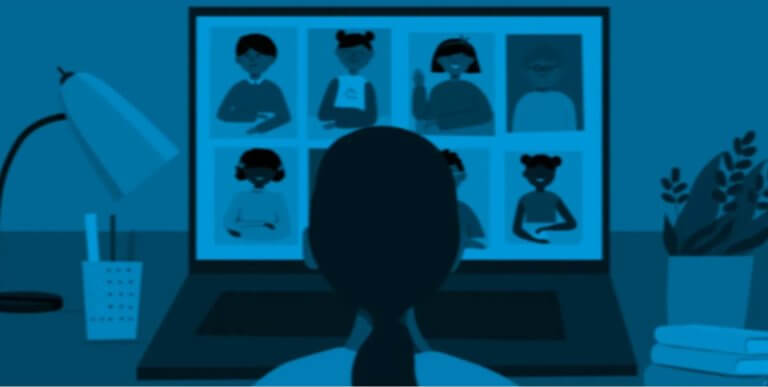
Child Abuse Is Harder to Spot During the Pandemic. What Can Educators Do?
In this podcast, Dr. Bart Klika shares how educators and school leaders can work with parents to create a home environment where abuse and neglect don’t happen.
Tips for Staying Connected
Tips for Staying Active & Engaged as a Family
Tips to Manage Stress & Anxiety
Resources for Families About COVID-19 Vaccines
Additional Resources for Parents, Children, Educators, Home Visitors & Others
For our collective health and well-being, we must adhere to the requirements of social distancing. Physical distance, however, does not mean we need to remain socially disconnected or isolated. In fact, individuals, families, and communities can maintain the one thing we all need right now…social connection! Here are some clear, concrete tips for physically distancing while staying emotionally and socially connected:
Connect with family—right now is a great time to connect with family members near and far.
Connect with friends and neighbors—our social circles often serve as our greatest system of support, and there’s plenty to do in lieu of play dates, shared meals, and group gatherings.
Connect with culture—with many schools closed and parents working from home, this is a great time for you and your children to connect with your culture, as well as cultural institutions.
Connect with yourself—confronted with the constant barrage of information, uncertainty, and day-to-day realities of caring for children, family, and loved ones, it is critical to find ways to connect with yourself.
With the cancellation of play dates, birthday parties, and sleep overs/unders, your household calendar is likely wide open—this is a great time to do the following as a family:
Common Sense Media has an abundance of resources for de-stressing, and the Center for Disease Control and Prevention (CDC) suggests numerous ways to manage stress and anxiety. Knowing the facts and the actual risks can help reduce stress in yourself and others. Take time to have conversations with your kids about their questions, concerns, or fears. Follow healthcare guidelines to model preventative care, and follow these tips and strategies to help structure your day:
Temper your expectations, and be kind to yourself—Remember, most of us were not prepared for this. Anxiety, fear, worry, and grief—these are all NORMAL reactions to abnormal circumstances. Laundry piles, dirty dishes, messy rooms—do what you can. And while we always suggest monitoring the use of children’s screen time, both how much and what they are watching, this may be a time where children have more screen time than they are accustomed to. Just make sure that your children are practicing safe online behavior. Here are some tips.
Embrace a rigid state of flexibility—Most children of all ages thrive when they have predictable routines. If your children are pre-school age or older, have them participate in the development of a daily schedule. When (not “if”) the schedule gets derailed, see Tip 1 above!
Find ways to stay informed—There is a constant barrage of information regarding COVID-19, and it is challenging to know what to think. Find trusted sources and limit your exposure to this material. Social media can be a major source of social support, but can also create feelings of fear, panic, and, for some, feelings of inadequacy. If seeing pictures of well-organized kitchen tables, Pinterest boards of fun activities, from those who you perceive “have it all put together,” are causing you distress, reconsider your relationship with social media for the time being. Talk with people you trust about your concerns about how you are feeling.
See the world through your children’s eyes—Do you remember what it was like to be a kid? Do you remember how boring it was to watch the news? Do you remember how cool it was when your parents did spontaneous things with you?
Learning can be fun—With uncertainty about the return to school, many parents are fretting about the potential loss of academics for their children. Fortunately, daily activities carry immense opportunity for learning:
Take care of your body—Take deep breaths, stretch, or meditate. Try to eat healthy, well-balanced meals, exercise regularly, get plenty of sleep, and avoid alcohol and drugs. Make time to unwind. Try to do some other activities you enjoy. Call your healthcare provider if stress gets in the way of your daily activities for several days in a row.
Healthy Families America, our signature home visiting program, has developed a resource page on talking to families about COVID-19 and COVID-19 vaccines.
Resources related to COVID vaccine misinformation:
Support families in evaluating the accuracy of health information:
Uplift organizations sharing accurate vaccine information:
For parents—this section provides resources for parents for how to talk with children about COVID-19. These strategies emphasize reassurance of child fears and anxieties, modeling proper hygiene, establishing routines in the case of school closures, and monitoring media use:
For children—this section provides age-appropriate resources for children (e.g., songs and videos) regarding proper hygiene, illness, and visits to medical professionals:
For educators—this section provides resources for schools to address the instructional and IT needs of distance learning opportunities for students:
For home visitors:
For early childhood/child development professionals:
For communities—this section provides resources and information regarding the disproportionate impact of COVID-19 on under-resourced communities and communities of color and ways in which communities can create “population-level” strategies to limit the contact and spread of COVID-19:
For businesses & employers—this section provides resources for business owners and employers on policies and practice for minimizing risk of COVID-19 in the workplace, organizational policies for emergency preparedness, and establishing policies for remote working:
For legislators:
For fundraisers and communications professionals:
For immigration advocates:
General: